Emotional and Cultural Intelligence
VerifiedAdded on 2023/01/16
|12
|3727
|63
AI Summary
This report discusses the importance of self-awareness and continuous self-development in becoming a successful leader and manager. It explores the strengths and weaknesses identified through self-analysis using two different toolkits. The report also highlights the role of emotional and cultural intelligence in managing relationships and adapting to organizational changes.
Contribute Materials
Your contribution can guide someone’s learning journey. Share your
documents today.
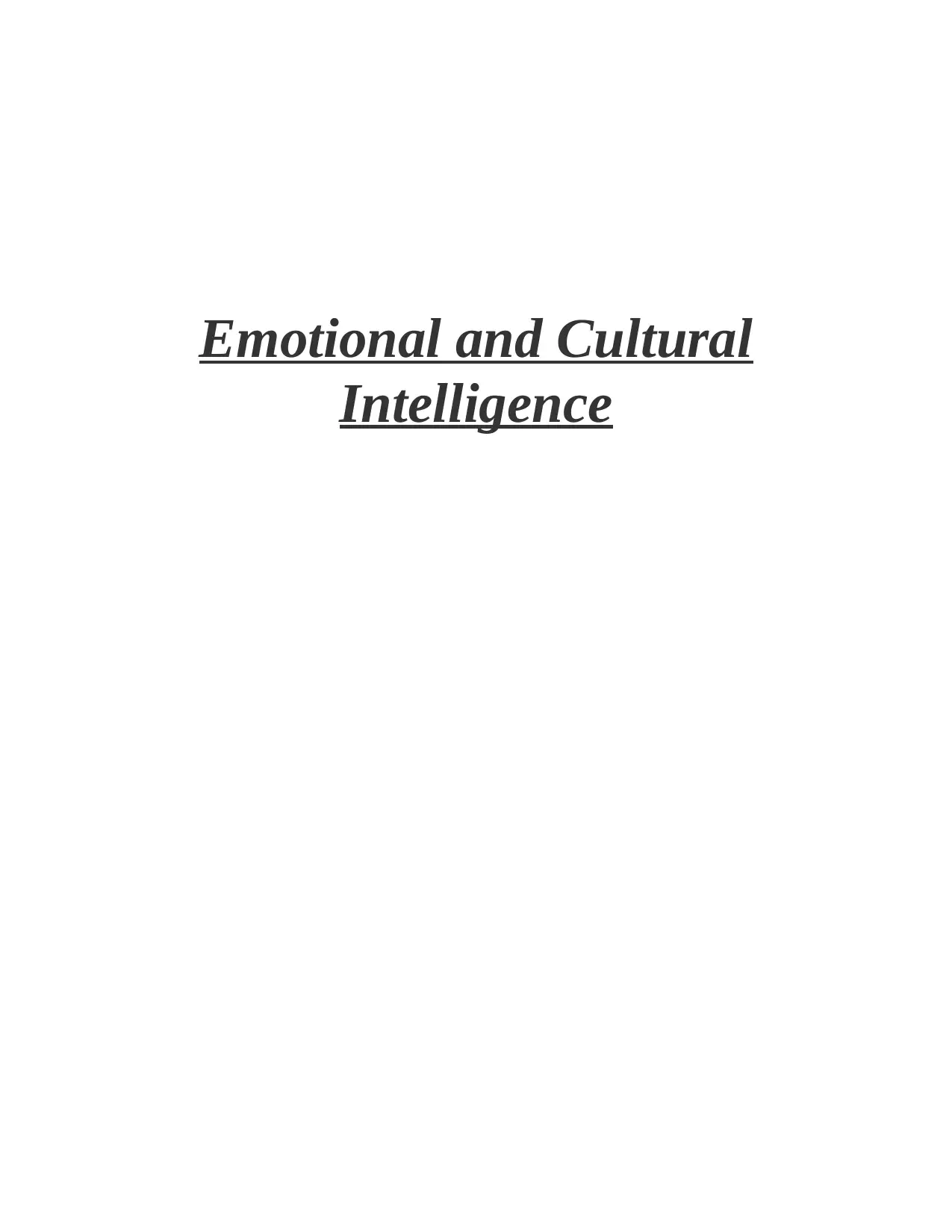
Emotional and Cultural
Intelligence
Intelligence
Secure Best Marks with AI Grader
Need help grading? Try our AI Grader for instant feedback on your assignments.
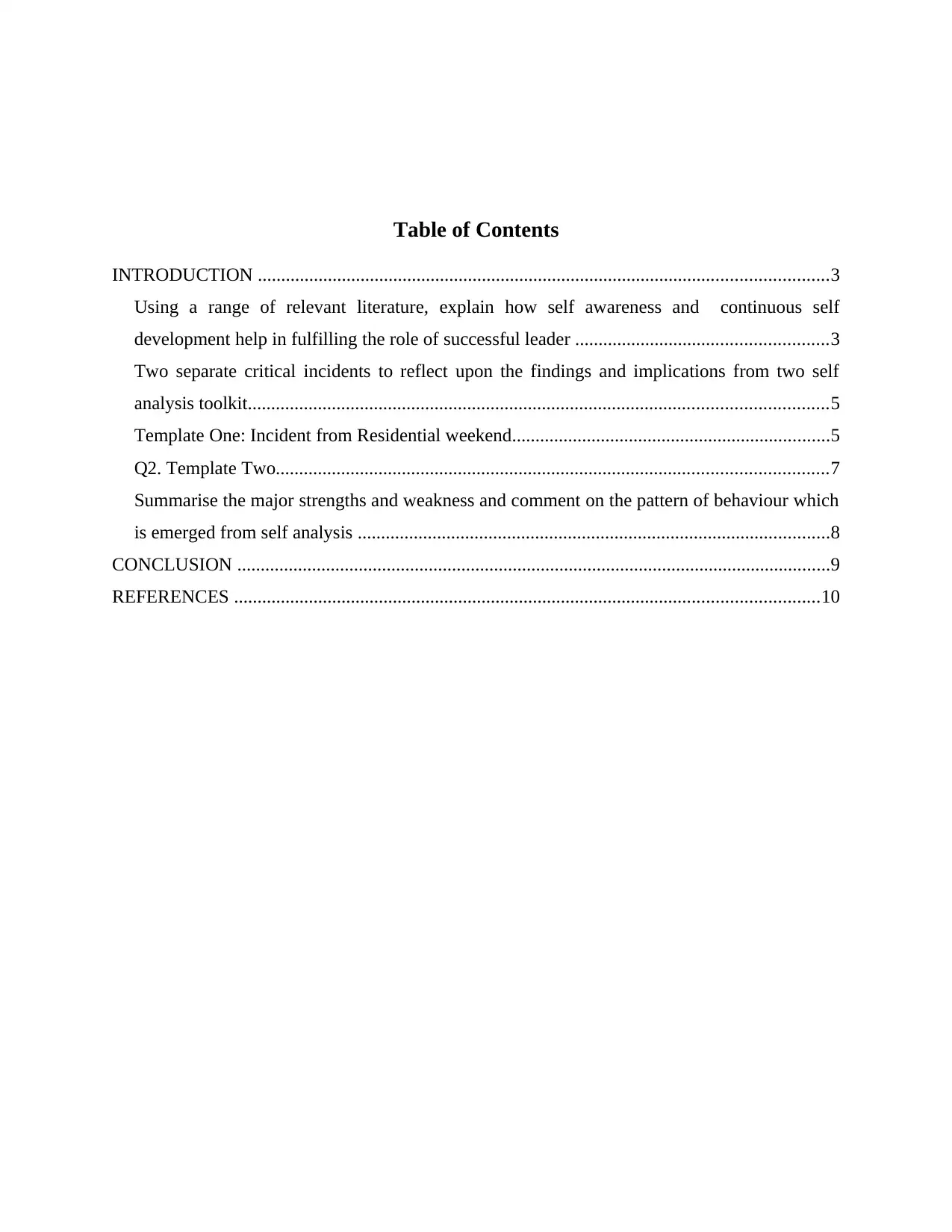
Table of Contents
INTRODUCTION ..........................................................................................................................3
Using a range of relevant literature, explain how self awareness and continuous self
development help in fulfilling the role of successful leader ......................................................3
Two separate critical incidents to reflect upon the findings and implications from two self
analysis toolkit............................................................................................................................5
Template One: Incident from Residential weekend....................................................................5
Q2. Template Two......................................................................................................................7
Summarise the major strengths and weakness and comment on the pattern of behaviour which
is emerged from self analysis .....................................................................................................8
CONCLUSION ...............................................................................................................................9
REFERENCES .............................................................................................................................10
INTRODUCTION ..........................................................................................................................3
Using a range of relevant literature, explain how self awareness and continuous self
development help in fulfilling the role of successful leader ......................................................3
Two separate critical incidents to reflect upon the findings and implications from two self
analysis toolkit............................................................................................................................5
Template One: Incident from Residential weekend....................................................................5
Q2. Template Two......................................................................................................................7
Summarise the major strengths and weakness and comment on the pattern of behaviour which
is emerged from self analysis .....................................................................................................8
CONCLUSION ...............................................................................................................................9
REFERENCES .............................................................................................................................10
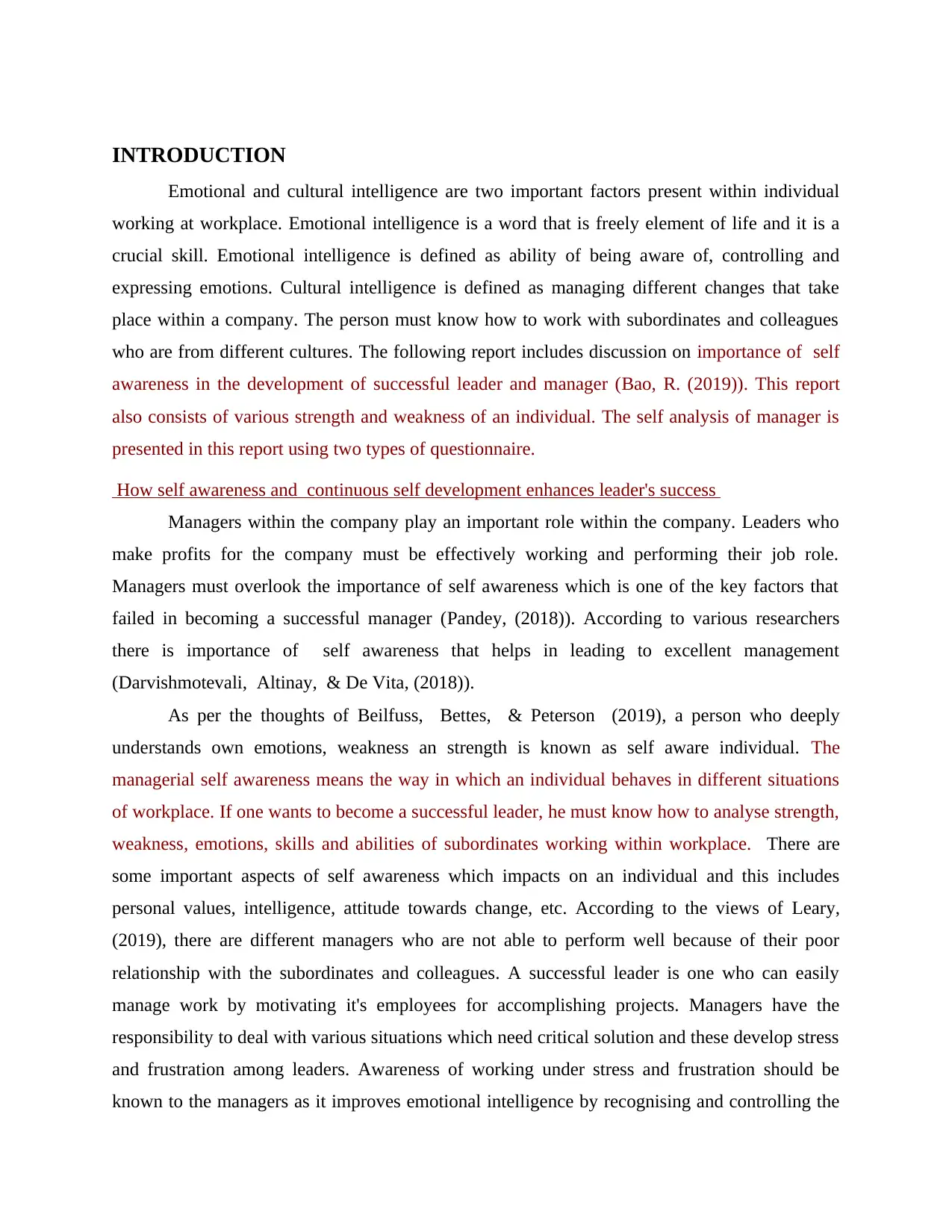
INTRODUCTION
Emotional and cultural intelligence are two important factors present within individual
working at workplace. Emotional intelligence is a word that is freely element of life and it is a
crucial skill. Emotional intelligence is defined as ability of being aware of, controlling and
expressing emotions. Cultural intelligence is defined as managing different changes that take
place within a company. The person must know how to work with subordinates and colleagues
who are from different cultures. The following report includes discussion on importance of self
awareness in the development of successful leader and manager (Bao, R. (2019)). This report
also consists of various strength and weakness of an individual. The self analysis of manager is
presented in this report using two types of questionnaire.
How self awareness and continuous self development enhances leader's success
Managers within the company play an important role within the company. Leaders who
make profits for the company must be effectively working and performing their job role.
Managers must overlook the importance of self awareness which is one of the key factors that
failed in becoming a successful manager (Pandey, (2018)). According to various researchers
there is importance of self awareness that helps in leading to excellent management
(Darvishmotevali, Altinay, & De Vita, (2018)).
As per the thoughts of Beilfuss, Bettes, & Peterson (2019), a person who deeply
understands own emotions, weakness an strength is known as self aware individual. The
managerial self awareness means the way in which an individual behaves in different situations
of workplace. If one wants to become a successful leader, he must know how to analyse strength,
weakness, emotions, skills and abilities of subordinates working within workplace. There are
some important aspects of self awareness which impacts on an individual and this includes
personal values, intelligence, attitude towards change, etc. According to the views of Leary,
(2019), there are different managers who are not able to perform well because of their poor
relationship with the subordinates and colleagues. A successful leader is one who can easily
manage work by motivating it's employees for accomplishing projects. Managers have the
responsibility to deal with various situations which need critical solution and these develop stress
and frustration among leaders. Awareness of working under stress and frustration should be
known to the managers as it improves emotional intelligence by recognising and controlling the
Emotional and cultural intelligence are two important factors present within individual
working at workplace. Emotional intelligence is a word that is freely element of life and it is a
crucial skill. Emotional intelligence is defined as ability of being aware of, controlling and
expressing emotions. Cultural intelligence is defined as managing different changes that take
place within a company. The person must know how to work with subordinates and colleagues
who are from different cultures. The following report includes discussion on importance of self
awareness in the development of successful leader and manager (Bao, R. (2019)). This report
also consists of various strength and weakness of an individual. The self analysis of manager is
presented in this report using two types of questionnaire.
How self awareness and continuous self development enhances leader's success
Managers within the company play an important role within the company. Leaders who
make profits for the company must be effectively working and performing their job role.
Managers must overlook the importance of self awareness which is one of the key factors that
failed in becoming a successful manager (Pandey, (2018)). According to various researchers
there is importance of self awareness that helps in leading to excellent management
(Darvishmotevali, Altinay, & De Vita, (2018)).
As per the thoughts of Beilfuss, Bettes, & Peterson (2019), a person who deeply
understands own emotions, weakness an strength is known as self aware individual. The
managerial self awareness means the way in which an individual behaves in different situations
of workplace. If one wants to become a successful leader, he must know how to analyse strength,
weakness, emotions, skills and abilities of subordinates working within workplace. There are
some important aspects of self awareness which impacts on an individual and this includes
personal values, intelligence, attitude towards change, etc. According to the views of Leary,
(2019), there are different managers who are not able to perform well because of their poor
relationship with the subordinates and colleagues. A successful leader is one who can easily
manage work by motivating it's employees for accomplishing projects. Managers have the
responsibility to deal with various situations which need critical solution and these develop stress
and frustration among leaders. Awareness of working under stress and frustration should be
known to the managers as it improves emotional intelligence by recognising and controlling the
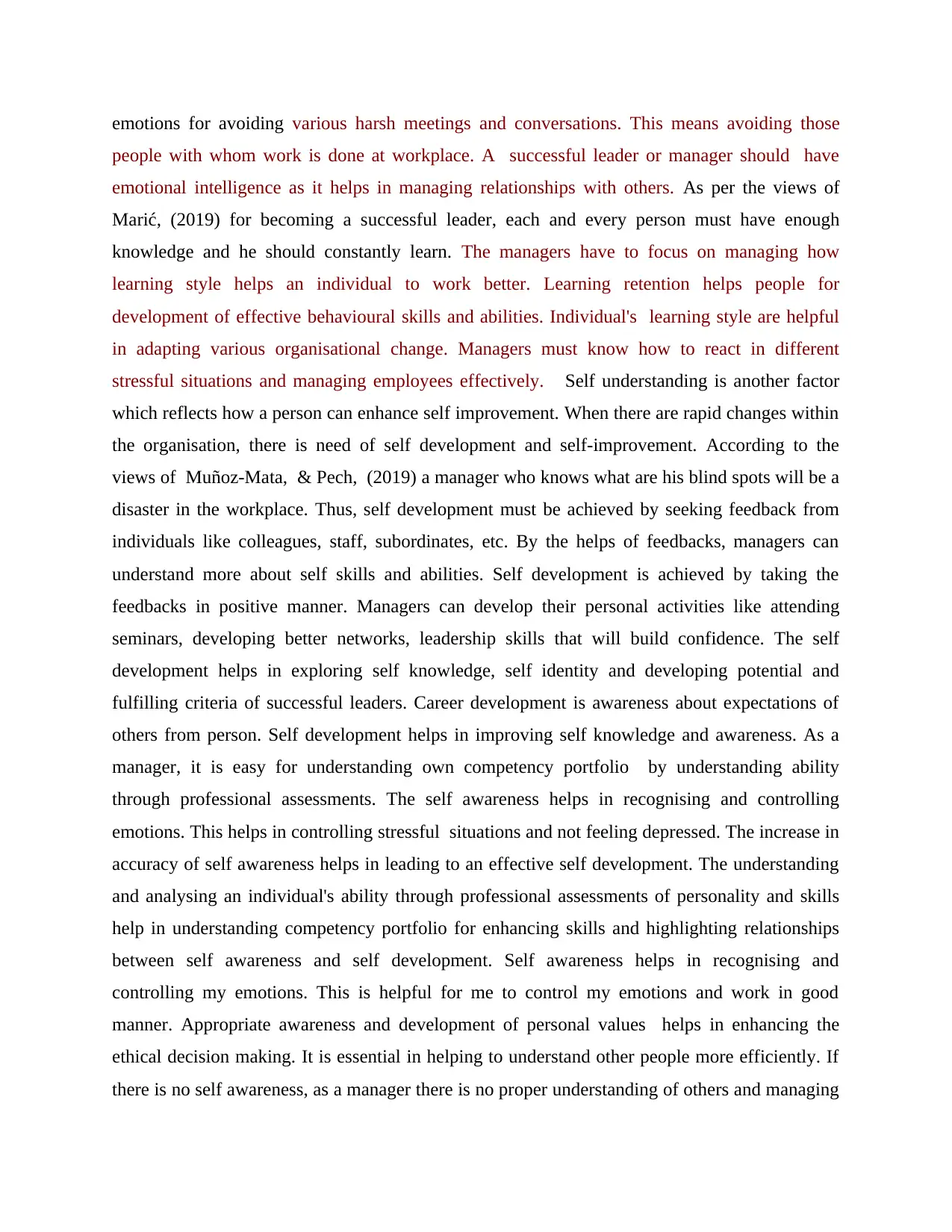
emotions for avoiding various harsh meetings and conversations. This means avoiding those
people with whom work is done at workplace. A successful leader or manager should have
emotional intelligence as it helps in managing relationships with others. As per the views of
Marić, (2019) for becoming a successful leader, each and every person must have enough
knowledge and he should constantly learn. The managers have to focus on managing how
learning style helps an individual to work better. Learning retention helps people for
development of effective behavioural skills and abilities. Individual's learning style are helpful
in adapting various organisational change. Managers must know how to react in different
stressful situations and managing employees effectively. Self understanding is another factor
which reflects how a person can enhance self improvement. When there are rapid changes within
the organisation, there is need of self development and self-improvement. According to the
views of Muñoz-Mata, & Pech, (2019) a manager who knows what are his blind spots will be a
disaster in the workplace. Thus, self development must be achieved by seeking feedback from
individuals like colleagues, staff, subordinates, etc. By the helps of feedbacks, managers can
understand more about self skills and abilities. Self development is achieved by taking the
feedbacks in positive manner. Managers can develop their personal activities like attending
seminars, developing better networks, leadership skills that will build confidence. The self
development helps in exploring self knowledge, self identity and developing potential and
fulfilling criteria of successful leaders. Career development is awareness about expectations of
others from person. Self development helps in improving self knowledge and awareness. As a
manager, it is easy for understanding own competency portfolio by understanding ability
through professional assessments. The self awareness helps in recognising and controlling
emotions. This helps in controlling stressful situations and not feeling depressed. The increase in
accuracy of self awareness helps in leading to an effective self development. The understanding
and analysing an individual's ability through professional assessments of personality and skills
help in understanding competency portfolio for enhancing skills and highlighting relationships
between self awareness and self development. Self awareness helps in recognising and
controlling my emotions. This is helpful for me to control my emotions and work in good
manner. Appropriate awareness and development of personal values helps in enhancing the
ethical decision making. It is essential in helping to understand other people more efficiently. If
there is no self awareness, as a manager there is no proper understanding of others and managing
people with whom work is done at workplace. A successful leader or manager should have
emotional intelligence as it helps in managing relationships with others. As per the views of
Marić, (2019) for becoming a successful leader, each and every person must have enough
knowledge and he should constantly learn. The managers have to focus on managing how
learning style helps an individual to work better. Learning retention helps people for
development of effective behavioural skills and abilities. Individual's learning style are helpful
in adapting various organisational change. Managers must know how to react in different
stressful situations and managing employees effectively. Self understanding is another factor
which reflects how a person can enhance self improvement. When there are rapid changes within
the organisation, there is need of self development and self-improvement. According to the
views of Muñoz-Mata, & Pech, (2019) a manager who knows what are his blind spots will be a
disaster in the workplace. Thus, self development must be achieved by seeking feedback from
individuals like colleagues, staff, subordinates, etc. By the helps of feedbacks, managers can
understand more about self skills and abilities. Self development is achieved by taking the
feedbacks in positive manner. Managers can develop their personal activities like attending
seminars, developing better networks, leadership skills that will build confidence. The self
development helps in exploring self knowledge, self identity and developing potential and
fulfilling criteria of successful leaders. Career development is awareness about expectations of
others from person. Self development helps in improving self knowledge and awareness. As a
manager, it is easy for understanding own competency portfolio by understanding ability
through professional assessments. The self awareness helps in recognising and controlling
emotions. This helps in controlling stressful situations and not feeling depressed. The increase in
accuracy of self awareness helps in leading to an effective self development. The understanding
and analysing an individual's ability through professional assessments of personality and skills
help in understanding competency portfolio for enhancing skills and highlighting relationships
between self awareness and self development. Self awareness helps in recognising and
controlling my emotions. This is helpful for me to control my emotions and work in good
manner. Appropriate awareness and development of personal values helps in enhancing the
ethical decision making. It is essential in helping to understand other people more efficiently. If
there is no self awareness, as a manager there is no proper understanding of others and managing
Secure Best Marks with AI Grader
Need help grading? Try our AI Grader for instant feedback on your assignments.
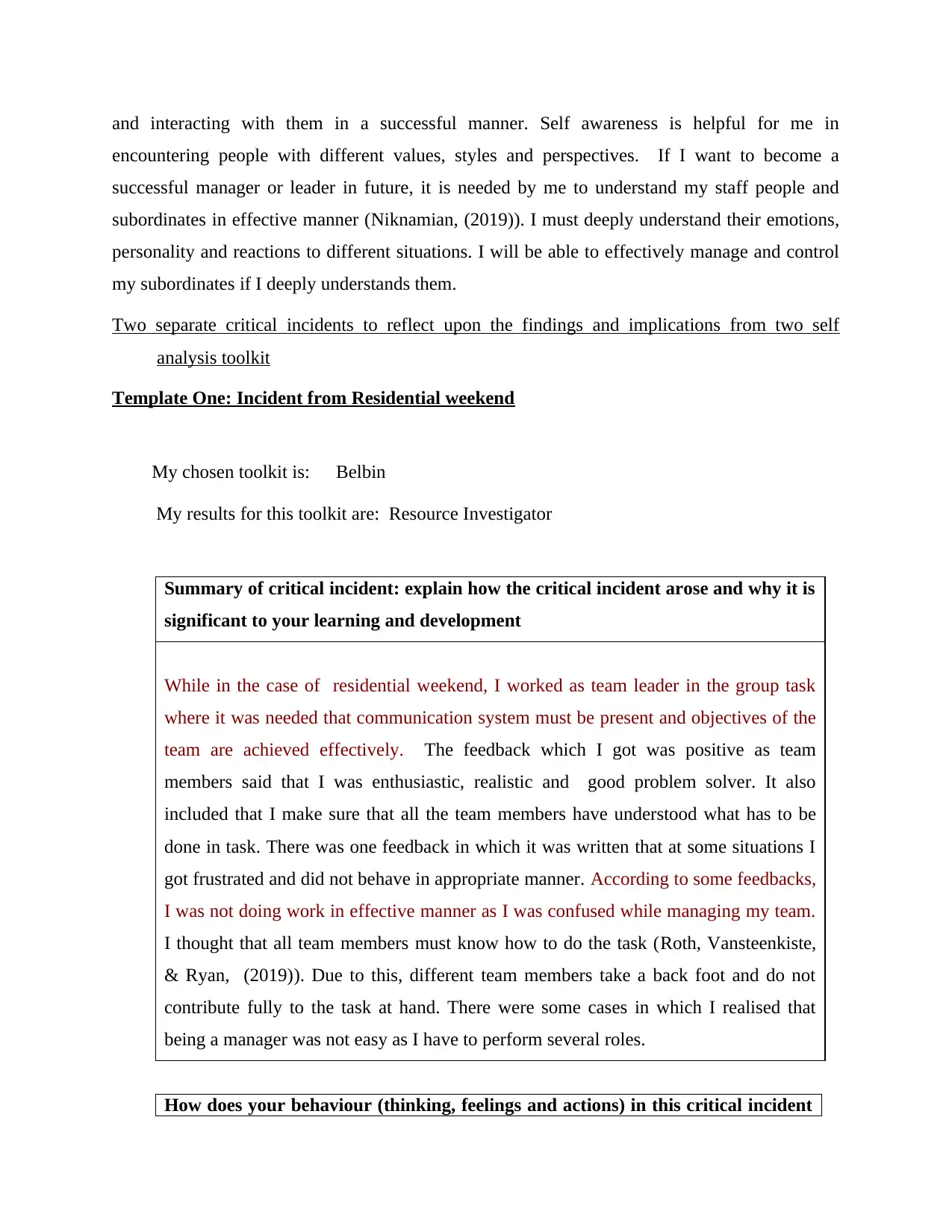
and interacting with them in a successful manner. Self awareness is helpful for me in
encountering people with different values, styles and perspectives. If I want to become a
successful manager or leader in future, it is needed by me to understand my staff people and
subordinates in effective manner (Niknamian, (2019)). I must deeply understand their emotions,
personality and reactions to different situations. I will be able to effectively manage and control
my subordinates if I deeply understands them.
Two separate critical incidents to reflect upon the findings and implications from two self
analysis toolkit
Template One: Incident from Residential weekend
My chosen toolkit is: Belbin
My results for this toolkit are: Resource Investigator
Summary of critical incident: explain how the critical incident arose and why it is
significant to your learning and development
While in the case of residential weekend, I worked as team leader in the group task
where it was needed that communication system must be present and objectives of the
team are achieved effectively. The feedback which I got was positive as team
members said that I was enthusiastic, realistic and good problem solver. It also
included that I make sure that all the team members have understood what has to be
done in task. There was one feedback in which it was written that at some situations I
got frustrated and did not behave in appropriate manner. According to some feedbacks,
I was not doing work in effective manner as I was confused while managing my team.
I thought that all team members must know how to do the task (Roth, Vansteenkiste,
& Ryan, (2019)). Due to this, different team members take a back foot and do not
contribute fully to the task at hand. There were some cases in which I realised that
being a manager was not easy as I have to perform several roles.
How does your behaviour (thinking, feelings and actions) in this critical incident
encountering people with different values, styles and perspectives. If I want to become a
successful manager or leader in future, it is needed by me to understand my staff people and
subordinates in effective manner (Niknamian, (2019)). I must deeply understand their emotions,
personality and reactions to different situations. I will be able to effectively manage and control
my subordinates if I deeply understands them.
Two separate critical incidents to reflect upon the findings and implications from two self
analysis toolkit
Template One: Incident from Residential weekend
My chosen toolkit is: Belbin
My results for this toolkit are: Resource Investigator
Summary of critical incident: explain how the critical incident arose and why it is
significant to your learning and development
While in the case of residential weekend, I worked as team leader in the group task
where it was needed that communication system must be present and objectives of the
team are achieved effectively. The feedback which I got was positive as team
members said that I was enthusiastic, realistic and good problem solver. It also
included that I make sure that all the team members have understood what has to be
done in task. There was one feedback in which it was written that at some situations I
got frustrated and did not behave in appropriate manner. According to some feedbacks,
I was not doing work in effective manner as I was confused while managing my team.
I thought that all team members must know how to do the task (Roth, Vansteenkiste,
& Ryan, (2019)). Due to this, different team members take a back foot and do not
contribute fully to the task at hand. There were some cases in which I realised that
being a manager was not easy as I have to perform several roles.
How does your behaviour (thinking, feelings and actions) in this critical incident
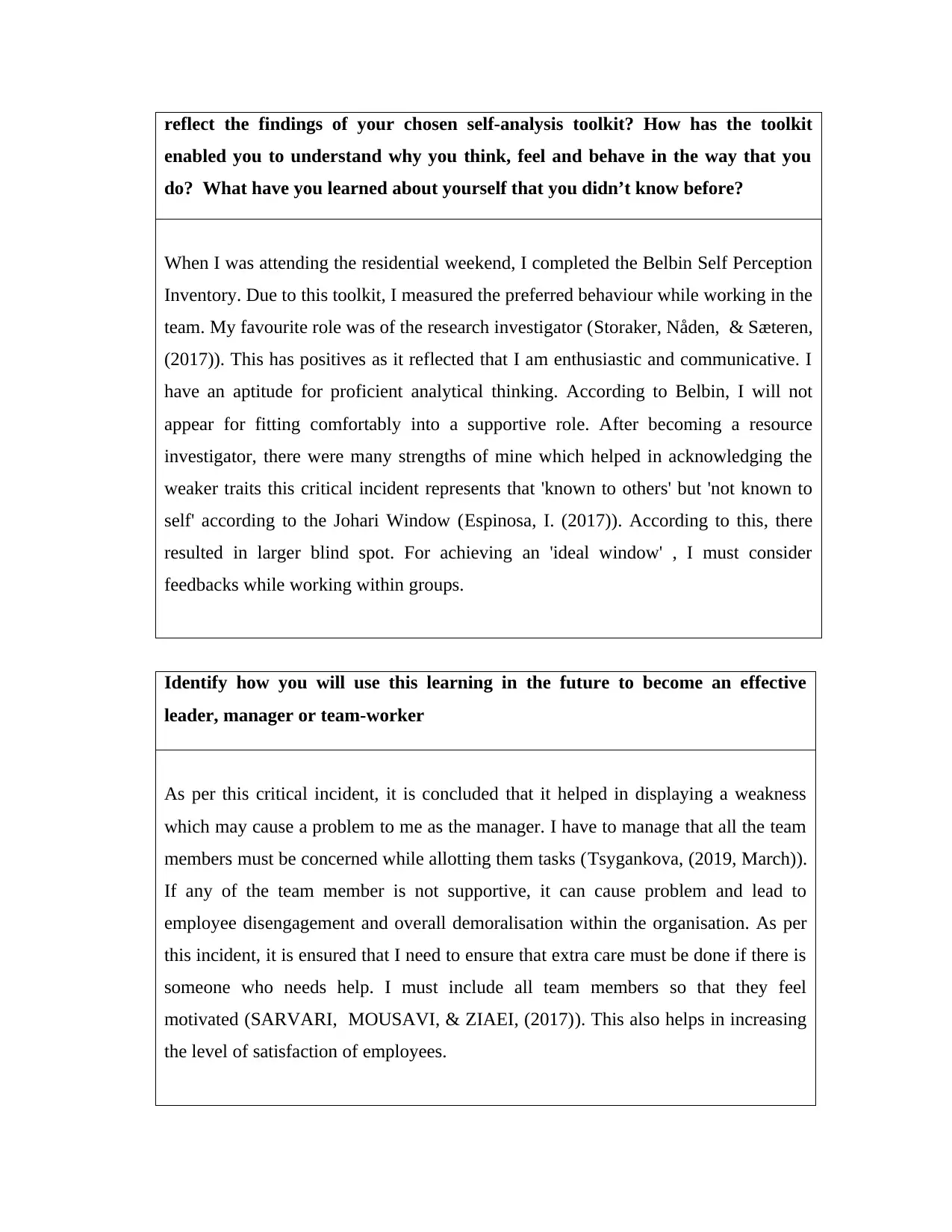
reflect the findings of your chosen self-analysis toolkit? How has the toolkit
enabled you to understand why you think, feel and behave in the way that you
do? What have you learned about yourself that you didn’t know before?
When I was attending the residential weekend, I completed the Belbin Self Perception
Inventory. Due to this toolkit, I measured the preferred behaviour while working in the
team. My favourite role was of the research investigator (Storaker, Nåden, & Sæteren,
(2017)). This has positives as it reflected that I am enthusiastic and communicative. I
have an aptitude for proficient analytical thinking. According to Belbin, I will not
appear for fitting comfortably into a supportive role. After becoming a resource
investigator, there were many strengths of mine which helped in acknowledging the
weaker traits this critical incident represents that 'known to others' but 'not known to
self' according to the Johari Window (Espinosa, I. (2017)). According to this, there
resulted in larger blind spot. For achieving an 'ideal window' , I must consider
feedbacks while working within groups.
Identify how you will use this learning in the future to become an effective
leader, manager or team-worker
As per this critical incident, it is concluded that it helped in displaying a weakness
which may cause a problem to me as the manager. I have to manage that all the team
members must be concerned while allotting them tasks (Tsygankova, (2019, March)).
If any of the team member is not supportive, it can cause problem and lead to
employee disengagement and overall demoralisation within the organisation. As per
this incident, it is ensured that I need to ensure that extra care must be done if there is
someone who needs help. I must include all team members so that they feel
motivated (SARVARI, MOUSAVI, & ZIAEI, (2017)). This also helps in increasing
the level of satisfaction of employees.
enabled you to understand why you think, feel and behave in the way that you
do? What have you learned about yourself that you didn’t know before?
When I was attending the residential weekend, I completed the Belbin Self Perception
Inventory. Due to this toolkit, I measured the preferred behaviour while working in the
team. My favourite role was of the research investigator (Storaker, Nåden, & Sæteren,
(2017)). This has positives as it reflected that I am enthusiastic and communicative. I
have an aptitude for proficient analytical thinking. According to Belbin, I will not
appear for fitting comfortably into a supportive role. After becoming a resource
investigator, there were many strengths of mine which helped in acknowledging the
weaker traits this critical incident represents that 'known to others' but 'not known to
self' according to the Johari Window (Espinosa, I. (2017)). According to this, there
resulted in larger blind spot. For achieving an 'ideal window' , I must consider
feedbacks while working within groups.
Identify how you will use this learning in the future to become an effective
leader, manager or team-worker
As per this critical incident, it is concluded that it helped in displaying a weakness
which may cause a problem to me as the manager. I have to manage that all the team
members must be concerned while allotting them tasks (Tsygankova, (2019, March)).
If any of the team member is not supportive, it can cause problem and lead to
employee disengagement and overall demoralisation within the organisation. As per
this incident, it is ensured that I need to ensure that extra care must be done if there is
someone who needs help. I must include all team members so that they feel
motivated (SARVARI, MOUSAVI, & ZIAEI, (2017)). This also helps in increasing
the level of satisfaction of employees.

Paraphrase This Document
Need a fresh take? Get an instant paraphrase of this document with our AI Paraphraser
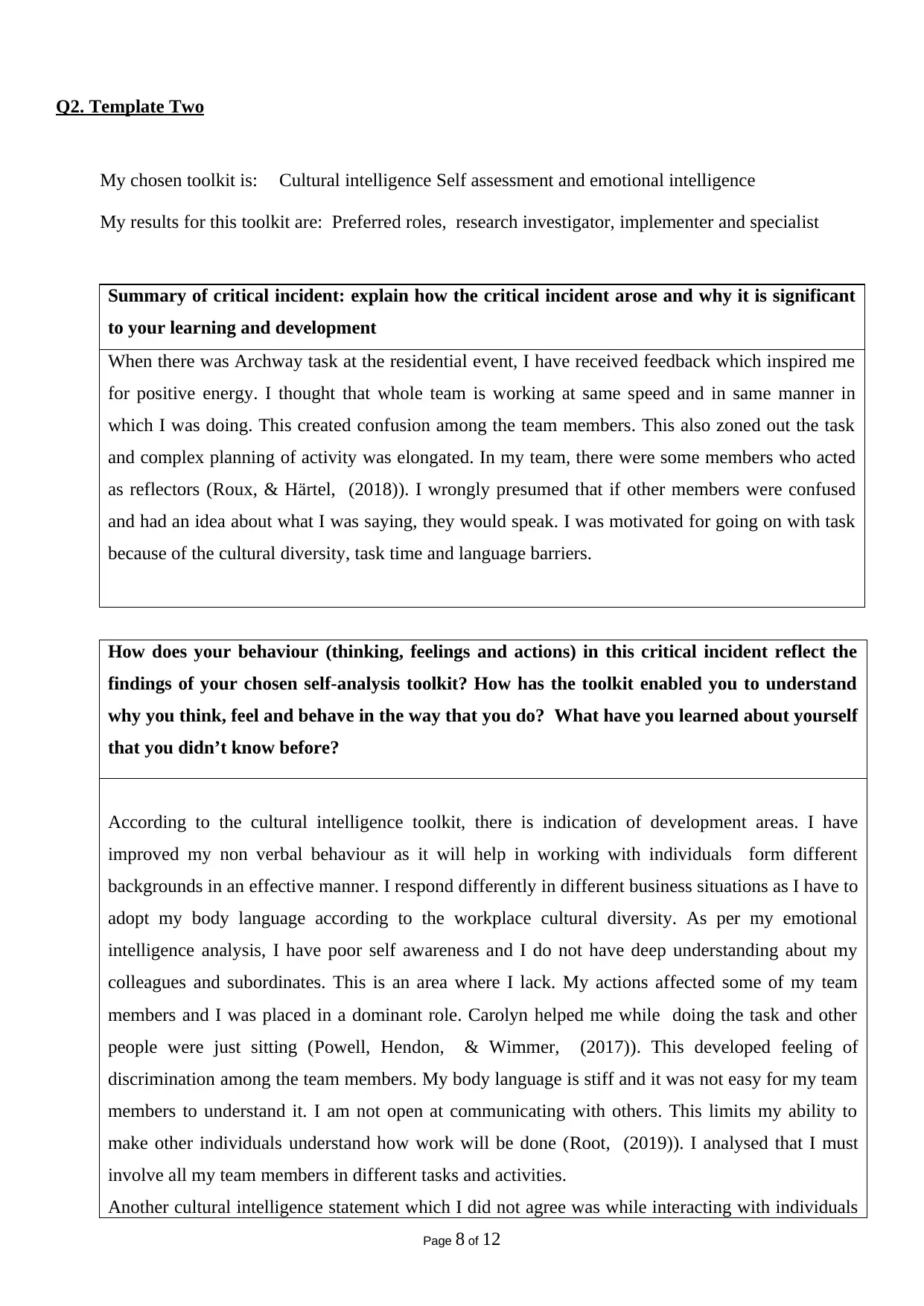
Q2. Template Two
My chosen toolkit is: Cultural intelligence Self assessment and emotional intelligence
My results for this toolkit are: Preferred roles, research investigator, implementer and specialist
Summary of critical incident: explain how the critical incident arose and why it is significant
to your learning and development
When there was Archway task at the residential event, I have received feedback which inspired me
for positive energy. I thought that whole team is working at same speed and in same manner in
which I was doing. This created confusion among the team members. This also zoned out the task
and complex planning of activity was elongated. In my team, there were some members who acted
as reflectors (Roux, & Härtel, (2018)). I wrongly presumed that if other members were confused
and had an idea about what I was saying, they would speak. I was motivated for going on with task
because of the cultural diversity, task time and language barriers.
How does your behaviour (thinking, feelings and actions) in this critical incident reflect the
findings of your chosen self-analysis toolkit? How has the toolkit enabled you to understand
why you think, feel and behave in the way that you do? What have you learned about yourself
that you didn’t know before?
According to the cultural intelligence toolkit, there is indication of development areas. I have
improved my non verbal behaviour as it will help in working with individuals form different
backgrounds in an effective manner. I respond differently in different business situations as I have to
adopt my body language according to the workplace cultural diversity. As per my emotional
intelligence analysis, I have poor self awareness and I do not have deep understanding about my
colleagues and subordinates. This is an area where I lack. My actions affected some of my team
members and I was placed in a dominant role. Carolyn helped me while doing the task and other
people were just sitting (Powell, Hendon, & Wimmer, (2017)). This developed feeling of
discrimination among the team members. My body language is stiff and it was not easy for my team
members to understand it. I am not open at communicating with others. This limits my ability to
make other individuals understand how work will be done (Root, (2019)). I analysed that I must
involve all my team members in different tasks and activities.
Another cultural intelligence statement which I did not agree was while interacting with individuals
Page 8 of 12
My chosen toolkit is: Cultural intelligence Self assessment and emotional intelligence
My results for this toolkit are: Preferred roles, research investigator, implementer and specialist
Summary of critical incident: explain how the critical incident arose and why it is significant
to your learning and development
When there was Archway task at the residential event, I have received feedback which inspired me
for positive energy. I thought that whole team is working at same speed and in same manner in
which I was doing. This created confusion among the team members. This also zoned out the task
and complex planning of activity was elongated. In my team, there were some members who acted
as reflectors (Roux, & Härtel, (2018)). I wrongly presumed that if other members were confused
and had an idea about what I was saying, they would speak. I was motivated for going on with task
because of the cultural diversity, task time and language barriers.
How does your behaviour (thinking, feelings and actions) in this critical incident reflect the
findings of your chosen self-analysis toolkit? How has the toolkit enabled you to understand
why you think, feel and behave in the way that you do? What have you learned about yourself
that you didn’t know before?
According to the cultural intelligence toolkit, there is indication of development areas. I have
improved my non verbal behaviour as it will help in working with individuals form different
backgrounds in an effective manner. I respond differently in different business situations as I have to
adopt my body language according to the workplace cultural diversity. As per my emotional
intelligence analysis, I have poor self awareness and I do not have deep understanding about my
colleagues and subordinates. This is an area where I lack. My actions affected some of my team
members and I was placed in a dominant role. Carolyn helped me while doing the task and other
people were just sitting (Powell, Hendon, & Wimmer, (2017)). This developed feeling of
discrimination among the team members. My body language is stiff and it was not easy for my team
members to understand it. I am not open at communicating with others. This limits my ability to
make other individuals understand how work will be done (Root, (2019)). I analysed that I must
involve all my team members in different tasks and activities.
Another cultural intelligence statement which I did not agree was while interacting with individuals
Page 8 of 12
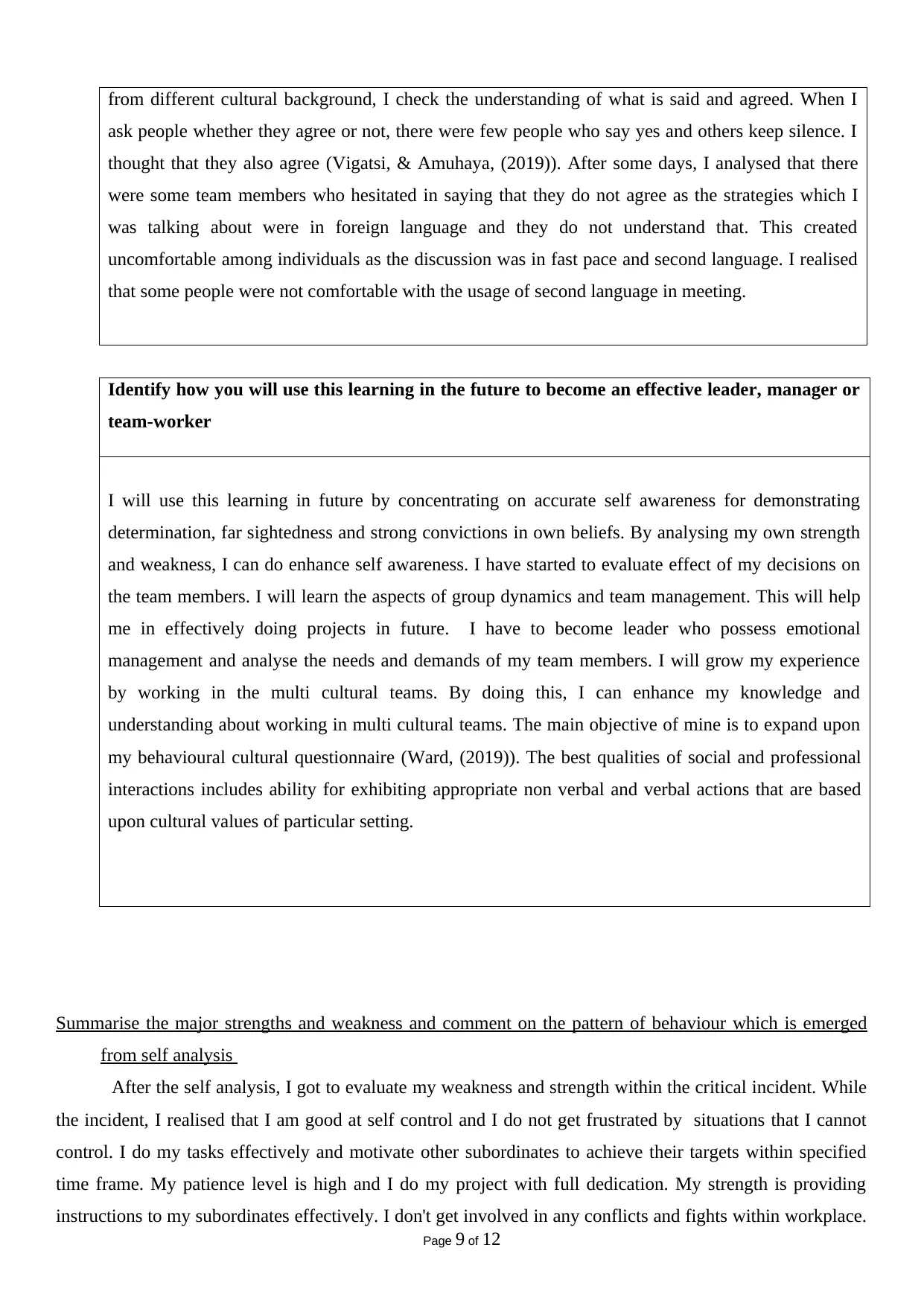
from different cultural background, I check the understanding of what is said and agreed. When I
ask people whether they agree or not, there were few people who say yes and others keep silence. I
thought that they also agree (Vigatsi, & Amuhaya, (2019)). After some days, I analysed that there
were some team members who hesitated in saying that they do not agree as the strategies which I
was talking about were in foreign language and they do not understand that. This created
uncomfortable among individuals as the discussion was in fast pace and second language. I realised
that some people were not comfortable with the usage of second language in meeting.
Identify how you will use this learning in the future to become an effective leader, manager or
team-worker
I will use this learning in future by concentrating on accurate self awareness for demonstrating
determination, far sightedness and strong convictions in own beliefs. By analysing my own strength
and weakness, I can do enhance self awareness. I have started to evaluate effect of my decisions on
the team members. I will learn the aspects of group dynamics and team management. This will help
me in effectively doing projects in future. I have to become leader who possess emotional
management and analyse the needs and demands of my team members. I will grow my experience
by working in the multi cultural teams. By doing this, I can enhance my knowledge and
understanding about working in multi cultural teams. The main objective of mine is to expand upon
my behavioural cultural questionnaire (Ward, (2019)). The best qualities of social and professional
interactions includes ability for exhibiting appropriate non verbal and verbal actions that are based
upon cultural values of particular setting.
Summarise the major strengths and weakness and comment on the pattern of behaviour which is emerged
from self analysis
After the self analysis, I got to evaluate my weakness and strength within the critical incident. While
the incident, I realised that I am good at self control and I do not get frustrated by situations that I cannot
control. I do my tasks effectively and motivate other subordinates to achieve their targets within specified
time frame. My patience level is high and I do my project with full dedication. My strength is providing
instructions to my subordinates effectively. I don't get involved in any conflicts and fights within workplace.
Page 9 of 12
ask people whether they agree or not, there were few people who say yes and others keep silence. I
thought that they also agree (Vigatsi, & Amuhaya, (2019)). After some days, I analysed that there
were some team members who hesitated in saying that they do not agree as the strategies which I
was talking about were in foreign language and they do not understand that. This created
uncomfortable among individuals as the discussion was in fast pace and second language. I realised
that some people were not comfortable with the usage of second language in meeting.
Identify how you will use this learning in the future to become an effective leader, manager or
team-worker
I will use this learning in future by concentrating on accurate self awareness for demonstrating
determination, far sightedness and strong convictions in own beliefs. By analysing my own strength
and weakness, I can do enhance self awareness. I have started to evaluate effect of my decisions on
the team members. I will learn the aspects of group dynamics and team management. This will help
me in effectively doing projects in future. I have to become leader who possess emotional
management and analyse the needs and demands of my team members. I will grow my experience
by working in the multi cultural teams. By doing this, I can enhance my knowledge and
understanding about working in multi cultural teams. The main objective of mine is to expand upon
my behavioural cultural questionnaire (Ward, (2019)). The best qualities of social and professional
interactions includes ability for exhibiting appropriate non verbal and verbal actions that are based
upon cultural values of particular setting.
Summarise the major strengths and weakness and comment on the pattern of behaviour which is emerged
from self analysis
After the self analysis, I got to evaluate my weakness and strength within the critical incident. While
the incident, I realised that I am good at self control and I do not get frustrated by situations that I cannot
control. I do my tasks effectively and motivate other subordinates to achieve their targets within specified
time frame. My patience level is high and I do my project with full dedication. My strength is providing
instructions to my subordinates effectively. I don't get involved in any conflicts and fights within workplace.
Page 9 of 12
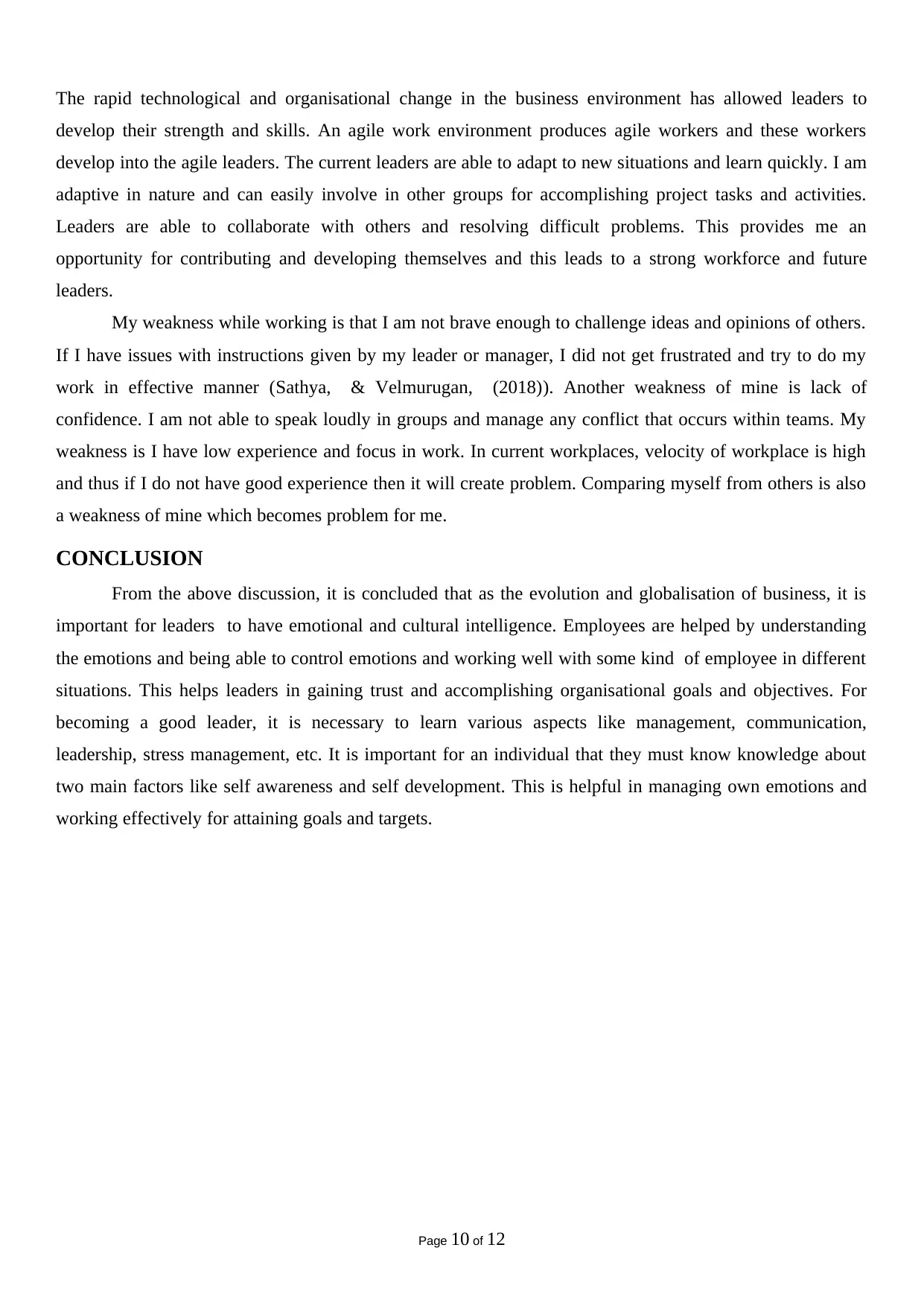
The rapid technological and organisational change in the business environment has allowed leaders to
develop their strength and skills. An agile work environment produces agile workers and these workers
develop into the agile leaders. The current leaders are able to adapt to new situations and learn quickly. I am
adaptive in nature and can easily involve in other groups for accomplishing project tasks and activities.
Leaders are able to collaborate with others and resolving difficult problems. This provides me an
opportunity for contributing and developing themselves and this leads to a strong workforce and future
leaders.
My weakness while working is that I am not brave enough to challenge ideas and opinions of others.
If I have issues with instructions given by my leader or manager, I did not get frustrated and try to do my
work in effective manner (Sathya, & Velmurugan, (2018)). Another weakness of mine is lack of
confidence. I am not able to speak loudly in groups and manage any conflict that occurs within teams. My
weakness is I have low experience and focus in work. In current workplaces, velocity of workplace is high
and thus if I do not have good experience then it will create problem. Comparing myself from others is also
a weakness of mine which becomes problem for me.
CONCLUSION
From the above discussion, it is concluded that as the evolution and globalisation of business, it is
important for leaders to have emotional and cultural intelligence. Employees are helped by understanding
the emotions and being able to control emotions and working well with some kind of employee in different
situations. This helps leaders in gaining trust and accomplishing organisational goals and objectives. For
becoming a good leader, it is necessary to learn various aspects like management, communication,
leadership, stress management, etc. It is important for an individual that they must know knowledge about
two main factors like self awareness and self development. This is helpful in managing own emotions and
working effectively for attaining goals and targets.
Page 10 of 12
develop their strength and skills. An agile work environment produces agile workers and these workers
develop into the agile leaders. The current leaders are able to adapt to new situations and learn quickly. I am
adaptive in nature and can easily involve in other groups for accomplishing project tasks and activities.
Leaders are able to collaborate with others and resolving difficult problems. This provides me an
opportunity for contributing and developing themselves and this leads to a strong workforce and future
leaders.
My weakness while working is that I am not brave enough to challenge ideas and opinions of others.
If I have issues with instructions given by my leader or manager, I did not get frustrated and try to do my
work in effective manner (Sathya, & Velmurugan, (2018)). Another weakness of mine is lack of
confidence. I am not able to speak loudly in groups and manage any conflict that occurs within teams. My
weakness is I have low experience and focus in work. In current workplaces, velocity of workplace is high
and thus if I do not have good experience then it will create problem. Comparing myself from others is also
a weakness of mine which becomes problem for me.
CONCLUSION
From the above discussion, it is concluded that as the evolution and globalisation of business, it is
important for leaders to have emotional and cultural intelligence. Employees are helped by understanding
the emotions and being able to control emotions and working well with some kind of employee in different
situations. This helps leaders in gaining trust and accomplishing organisational goals and objectives. For
becoming a good leader, it is necessary to learn various aspects like management, communication,
leadership, stress management, etc. It is important for an individual that they must know knowledge about
two main factors like self awareness and self development. This is helpful in managing own emotions and
working effectively for attaining goals and targets.
Page 10 of 12
Secure Best Marks with AI Grader
Need help grading? Try our AI Grader for instant feedback on your assignments.
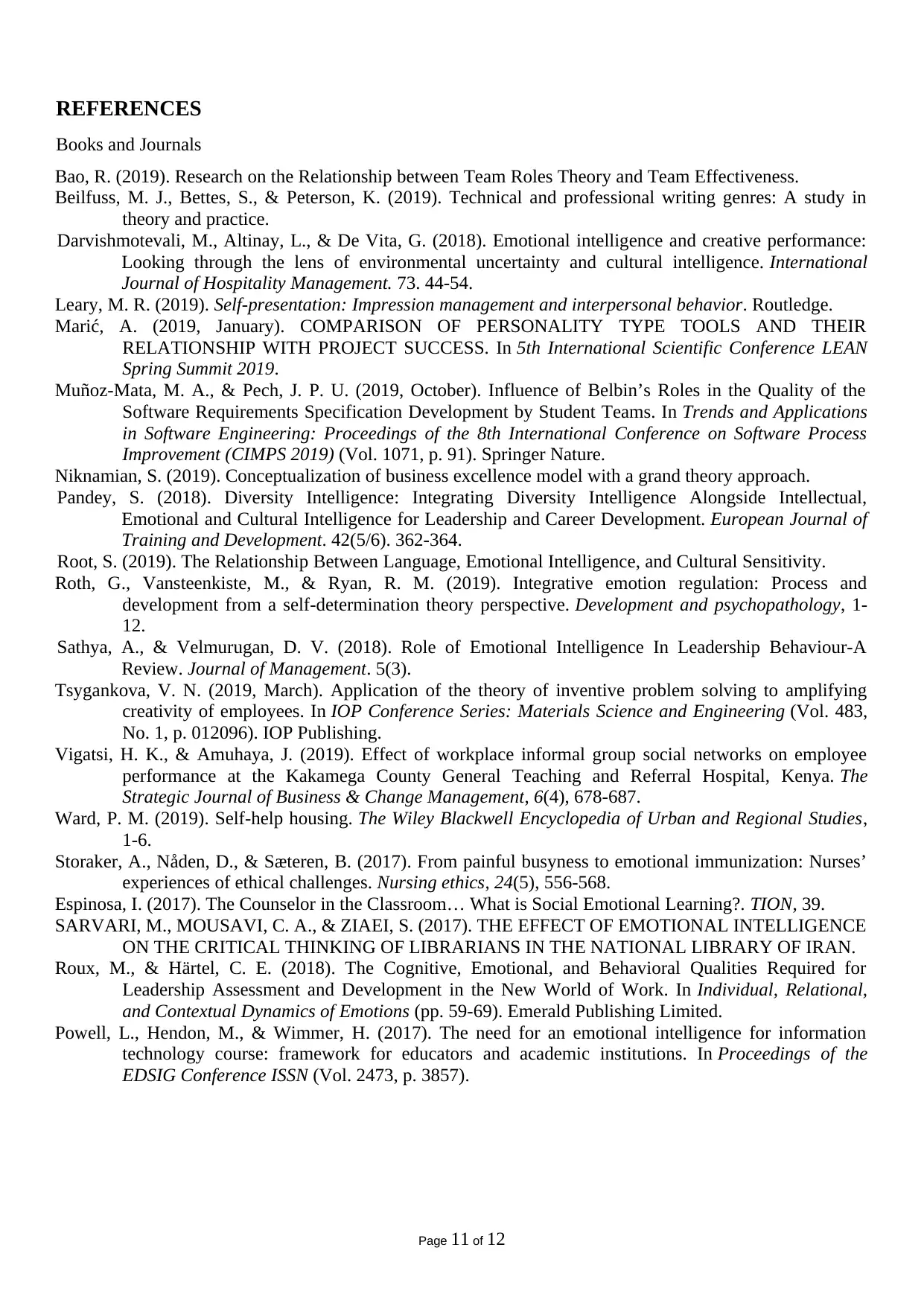
REFERENCES
Books and Journals
Bao, R. (2019). Research on the Relationship between Team Roles Theory and Team Effectiveness.
Beilfuss, M. J., Bettes, S., & Peterson, K. (2019). Technical and professional writing genres: A study in
theory and practice.
Darvishmotevali, M., Altinay, L., & De Vita, G. (2018). Emotional intelligence and creative performance:
Looking through the lens of environmental uncertainty and cultural intelligence. International
Journal of Hospitality Management. 73. 44-54.
Leary, M. R. (2019). Self-presentation: Impression management and interpersonal behavior. Routledge.
Marić, A. (2019, January). COMPARISON OF PERSONALITY TYPE TOOLS AND THEIR
RELATIONSHIP WITH PROJECT SUCCESS. In 5th International Scientific Conference LEAN
Spring Summit 2019.
Muñoz-Mata, M. A., & Pech, J. P. U. (2019, October). Influence of Belbin’s Roles in the Quality of the
Software Requirements Specification Development by Student Teams. In Trends and Applications
in Software Engineering: Proceedings of the 8th International Conference on Software Process
Improvement (CIMPS 2019) (Vol. 1071, p. 91). Springer Nature.
Niknamian, S. (2019). Conceptualization of business excellence model with a grand theory approach.
Pandey, S. (2018). Diversity Intelligence: Integrating Diversity Intelligence Alongside Intellectual,
Emotional and Cultural Intelligence for Leadership and Career Development. European Journal of
Training and Development. 42(5/6). 362-364.
Root, S. (2019). The Relationship Between Language, Emotional Intelligence, and Cultural Sensitivity.
Roth, G., Vansteenkiste, M., & Ryan, R. M. (2019). Integrative emotion regulation: Process and
development from a self-determination theory perspective. Development and psychopathology, 1-
12.
Sathya, A., & Velmurugan, D. V. (2018). Role of Emotional Intelligence In Leadership Behaviour-A
Review. Journal of Management. 5(3).
Tsygankova, V. N. (2019, March). Application of the theory of inventive problem solving to amplifying
creativity of employees. In IOP Conference Series: Materials Science and Engineering (Vol. 483,
No. 1, p. 012096). IOP Publishing.
Vigatsi, H. K., & Amuhaya, J. (2019). Effect of workplace informal group social networks on employee
performance at the Kakamega County General Teaching and Referral Hospital, Kenya. The
Strategic Journal of Business & Change Management, 6(4), 678-687.
Ward, P. M. (2019). Self‐help housing. The Wiley Blackwell Encyclopedia of Urban and Regional Studies,
1-6.
Storaker, A., Nåden, D., & Sæteren, B. (2017). From painful busyness to emotional immunization: Nurses’
experiences of ethical challenges. Nursing ethics, 24(5), 556-568.
Espinosa, I. (2017). The Counselor in the Classroom… What is Social Emotional Learning?. TION, 39.
SARVARI, M., MOUSAVI, C. A., & ZIAEI, S. (2017). THE EFFECT OF EMOTIONAL INTELLIGENCE
ON THE CRITICAL THINKING OF LIBRARIANS IN THE NATIONAL LIBRARY OF IRAN.
Roux, M., & Härtel, C. E. (2018). The Cognitive, Emotional, and Behavioral Qualities Required for
Leadership Assessment and Development in the New World of Work. In Individual, Relational,
and Contextual Dynamics of Emotions (pp. 59-69). Emerald Publishing Limited.
Powell, L., Hendon, M., & Wimmer, H. (2017). The need for an emotional intelligence for information
technology course: framework for educators and academic institutions. In Proceedings of the
EDSIG Conference ISSN (Vol. 2473, p. 3857).
Page 11 of 12
Books and Journals
Bao, R. (2019). Research on the Relationship between Team Roles Theory and Team Effectiveness.
Beilfuss, M. J., Bettes, S., & Peterson, K. (2019). Technical and professional writing genres: A study in
theory and practice.
Darvishmotevali, M., Altinay, L., & De Vita, G. (2018). Emotional intelligence and creative performance:
Looking through the lens of environmental uncertainty and cultural intelligence. International
Journal of Hospitality Management. 73. 44-54.
Leary, M. R. (2019). Self-presentation: Impression management and interpersonal behavior. Routledge.
Marić, A. (2019, January). COMPARISON OF PERSONALITY TYPE TOOLS AND THEIR
RELATIONSHIP WITH PROJECT SUCCESS. In 5th International Scientific Conference LEAN
Spring Summit 2019.
Muñoz-Mata, M. A., & Pech, J. P. U. (2019, October). Influence of Belbin’s Roles in the Quality of the
Software Requirements Specification Development by Student Teams. In Trends and Applications
in Software Engineering: Proceedings of the 8th International Conference on Software Process
Improvement (CIMPS 2019) (Vol. 1071, p. 91). Springer Nature.
Niknamian, S. (2019). Conceptualization of business excellence model with a grand theory approach.
Pandey, S. (2018). Diversity Intelligence: Integrating Diversity Intelligence Alongside Intellectual,
Emotional and Cultural Intelligence for Leadership and Career Development. European Journal of
Training and Development. 42(5/6). 362-364.
Root, S. (2019). The Relationship Between Language, Emotional Intelligence, and Cultural Sensitivity.
Roth, G., Vansteenkiste, M., & Ryan, R. M. (2019). Integrative emotion regulation: Process and
development from a self-determination theory perspective. Development and psychopathology, 1-
12.
Sathya, A., & Velmurugan, D. V. (2018). Role of Emotional Intelligence In Leadership Behaviour-A
Review. Journal of Management. 5(3).
Tsygankova, V. N. (2019, March). Application of the theory of inventive problem solving to amplifying
creativity of employees. In IOP Conference Series: Materials Science and Engineering (Vol. 483,
No. 1, p. 012096). IOP Publishing.
Vigatsi, H. K., & Amuhaya, J. (2019). Effect of workplace informal group social networks on employee
performance at the Kakamega County General Teaching and Referral Hospital, Kenya. The
Strategic Journal of Business & Change Management, 6(4), 678-687.
Ward, P. M. (2019). Self‐help housing. The Wiley Blackwell Encyclopedia of Urban and Regional Studies,
1-6.
Storaker, A., Nåden, D., & Sæteren, B. (2017). From painful busyness to emotional immunization: Nurses’
experiences of ethical challenges. Nursing ethics, 24(5), 556-568.
Espinosa, I. (2017). The Counselor in the Classroom… What is Social Emotional Learning?. TION, 39.
SARVARI, M., MOUSAVI, C. A., & ZIAEI, S. (2017). THE EFFECT OF EMOTIONAL INTELLIGENCE
ON THE CRITICAL THINKING OF LIBRARIANS IN THE NATIONAL LIBRARY OF IRAN.
Roux, M., & Härtel, C. E. (2018). The Cognitive, Emotional, and Behavioral Qualities Required for
Leadership Assessment and Development in the New World of Work. In Individual, Relational,
and Contextual Dynamics of Emotions (pp. 59-69). Emerald Publishing Limited.
Powell, L., Hendon, M., & Wimmer, H. (2017). The need for an emotional intelligence for information
technology course: framework for educators and academic institutions. In Proceedings of the
EDSIG Conference ISSN (Vol. 2473, p. 3857).
Page 11 of 12

Page 12 of 12
1 out of 12
Related Documents
Your All-in-One AI-Powered Toolkit for Academic Success.
+13062052269
info@desklib.com
Available 24*7 on WhatsApp / Email
![[object Object]](/_next/static/media/star-bottom.7253800d.svg)
Unlock your academic potential
© 2024 | Zucol Services PVT LTD | All rights reserved.





